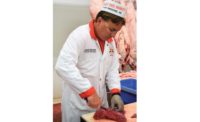Tom Eickman and his wife, Katie, represent the next in a line of family members that have overseen Eickman’s Processing, maintaining its tradition as an award-winning, widely respected meat processor. Exactly which generation he represents is up for debate.
John Eickman was a train depot master in Seward, Ill. who, in his spare time, would help neighbors butcher their livestock. His son, Merlyn, was born in the top floor of the depot. When that building was demolished in 1943, John bought a local creamery to process animals. He never officially christened the business after his family name, but he did establish the family in the meat business.
“That’s where it gets kind of gray — do you count him, or don’t you?” Tom says.
The rest of the story is a little more concrete. When Merlyn got older, he worked at plants in nearby Rockford and Pecatonica, eventually establishing Eickman’s in the latter city in 1953. The creamery building remained as a slaughterhouse, and meat was trucked to Pecatonica for processing. Operations were eventually condensed in the Seward building, which has expanded numerous times over the years. Merlyn’s son Mike started working there in 1964, and Tom Eickman became the third — or fourth — generation to work in the business full time in 1994.
Of course, like most people in family businesses, Tom was involved in the business long before then.
“I’d go out catering when I was eight,” he says. “I still use that line today. We do whole-roast pigs, and people are so far removed from the farm, that they say, ‘Oh, I don’t know how to cut it up.’ As an eight-year-old, I could cut it up, so it’s really not that difficult.”
Mike Eickman is still involved in the operations, and until relatively recently, Merlyn could often be found at the Seward store too. Tom says that he has benefited from having their experience as he’s grown and advanced through the business.
“Grandpa was always a big proponent of working out with the employees and being able to do everything that the employees do. I took that to heart and want to make sure I can do everything I’m asking them to do,” he says. “Dad’s been real supportive of coming with a new idea and talking it through, to see the pitfalls and the advantages.”
Despite a history that dates back more than 65 years, Eickman’s has adapted well to the times and the needs of its customers. Even 10 years ago, the concept of selling meat at farmer’s markets was largely unheard of, so the custom processing of farm animals was relatively simple.
“It used to be that everything was put in a simple white paper, put an ink stamp on it, and out the door,” Eickman says. “Now, there’s a lot more on the vacuum pack side, and custom labels are a huge thing, where the farmer wants their farm name represented on that package. Everyone is looking a little more at the marketing and how to keep their name in front of the customer and get that customer to come back to them.”
The company’s custom processing has gone through changes as well. Other smaller meat processors have shut down their slaughter operations to focus entirely on further processed meats, but Eickman’s is still seeing a demand for the service. It can process 50 to 60 cattle a week, as well as 40 to 60 hogs and 10 to 20 lambs. On top of that, the company occasionally is called upon to process some exotic animals, including domestic white-tail deer, camel, and even bear. The company has an arsenal of stunning equipment, from captive bolt and electric stunners to rifles. The variety of tools not only helps the employees with largest exotics, but it also enables them to ensure humane treatment for animals of any size and species.
“If we have a bigger beef and [an employee doesn’t] feel comfortable with a captive bolt gun, they let us know, and we’ll stop what we’re doing and bring down an appropriate [tool] to handle that animal. I want to make sure that whatever walks through the door, we can handle it properly,” he explains.
When it comes to processing, Eickman says that a basic understanding of livestock bone structure helps when processing out-of-the-ordinary animals. Bear, for instance, cuts like a hog, so workers know how to process the carcass appropriately. The same principles apply to camel and bison, which cut like beef.
Eickman describes a ripple effect that occurs when a neighboring processor stops slaughtering animals. Those former customers seek out the nearest processor, and customers of that business may have to turn elsewhere if they can’t get scheduled. When another Illinois processor stopped slaughter, Eickman’s saw a small uptick in business, even if it didn’t directly gain any of that other company’s customers.
The growth of farmer’s markets has helped the custom processing business grow as well.
“That’s something that didn’t exist in the early ‘90s when I started,” he says. “Go back to the early 1990s, and custom processing would go to the individual’s house. Now, the farmer will bring [the animals in] and we’ll give the meat back to him, and then he’ll resell it at markets and into different restaurants.”
About five years ago, Eickman’s began supplying meat to the Chicagoland area through a distributor.
“The Chicago market helps us immensely, because the cost of living is so much higher there that they can pay a premium price,” Eickman says. “I can wholesale beef into the city at the same price that I can retail it out here [in Seward].”
Chicagoland restaurants, like restaurants around the country, are increasingly interested in listing the origin of their protein on the menu. Customers will call Eickman looking for local meat, and he will direct them to a nearby farmer, who will then use Eickman’s for the processing. End users tend to stick with their farmers and do not usually leave that connection once it’s been established.
“As long as I do a good job, that producer will keep using me for the processing side of it, and we can both prosper out of the arrangement,” he adds.
A tradition of cured meat excellence
Along with its custom processing abilities, Eickman’s has a reputation for quality cured meats — a reputation that now spans the globe, considering the company won two gold and one silver medal at the IFFA Quality Competition, held last year in Frankfurt, Germany during the IFFA trade show. Both Merlyn and Mike Eickman are in the Cured Meats Hall of Fame, established by the American Association of Meat Processors (AAMP).
Tom Eickman says that if customers come in and ask about the “must-buy” products, he will steer them to the bacon, ham and dried beef. During the Christmas season, Eickman’s will produce more than 1,500 bone-in hams.
Eickman’s has won numerous awards for its cured meat products. Eickman attributes some of that to the company’s adherence on tried-and-true methods.
“We artery pump the hams still, and they cure out for 21 days before we put them in the smokehouse,” he explains. “The newest smokehouse is about 75 years old. They don’t have the bells and whistles, but the quality of product that comes out of them is just tremendous. Each one has its own personality traits, but we like that aspect of it. It’s something unique, something different, and it keeps giving the best quality that we can possibly do.”
Similarly, the bacon is not tumbled unless the company is using a natural cure. It will be dry cured for 21 days and smoked for 48 hours. That does necessitate a premium price for the product, but it finds a receptive audience. Despite being in a town of fewer than 200 people, the company can move several hundred pounds of bacon per week.
Eickman’s still uses many of the recipes that were developed by Merlyn Eickman. While some allowances have been made for modern consumer requirements, it hasn’t abandoned the traditional favorites. For example, instead of removing the monosodium glutamate from its breakfast sausage, it makes two varieties, one with MSG and one without.
“As long as the quality of that new one rivals the old one, then we’ll make both,” Eickman says.
Since he came into the business, Eickman has made some changes to the operations and the building itself, while preserving some of the time-honored methods. Now that he has been working full-time in the family business for more than 20 years, he chuckles at some of the family discussions that he had when he was new go-getter to the company.
“Now that I’ve gotten a little bit older, I start finding myself a little stuck in my ways a little bit. It helps build up an appreciation for my dad. I understand the thought process and why he thinks that way, because I’m starting to be similar,” he says. “We have one son, Ashton, who’s seven. Hopefully he’ll get into it and I can talk about how we used to do it, and he’ll say, ‘This is the new way to do it.’”









Report Abusive Comment